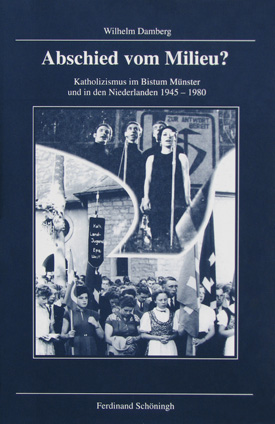Damberg, Wilhelm: Abschied vom Milieu? Katholizismus im Bistum Münster und in den Niederlanden 1945–1980, Paderborn [u. a.] 1997

Far-reaching changes in contemporary German Catholicism are impossible to overlook. Perhaps surprisingly, neither the causes of these processes nor the direction in which they point can clearly be established. The energetic debates between theologians, historians, sociologists, and opinion researchers revolve around a central question, the importance of the Second Vatican Council (1962–1965) to these changes.
How accurate is the widespread assessment that, until Vatican II, the Church and its members had set themselves up in a closed and »intact« world? Does that decription reflect the reality of the 1940s and 1950s? Or can we, with hindsight, identify problems that already existed then but only entered public consciousness with Vatican II? What is the relationship between the effects of Vatican II in Germany to the general societal changes that occurred in the 1960s and 1970s?
With his penetrating analysis of the changes in German Catholicism since 1945, Wilhelm Damberg answers these questions vividly and convincingly, using the example of the Münster diocese, long considered a particularly unrelenting bastion of Catholicism since the days of Bismarck’s Kulturkampf. His empirically-based, long-term investigation begins after World War II, when Catholics, in »closed battle ranks« under their bishop’s leadership, launched a missionary offensive to christianize society. It continues to the phase of reorientation ushered in by Vatican II and a broadening of the Catholic mission to »serving the world.« Damberg gives special attention to problems and conflicts that emerged with youth ministry and in the schools policies of the state of North Rhine-Westphalia in the decade after 1968.
Damberg’s study constitutes the first comparison of findings on the Münster diocese with the evolution of Catholicism in the neighboring Netherlands. Until 1962, Dutch Catholicism was widely considered an unsurpassed example of a closed Catholic milieu, which in many respects served as a model to the Münster diocesan leaders. In a radical break in the 1960s, Dutch Catholicism transformed seemingly overnight into the vanguard of Vatican II’s reform spirit, a role that earned it worldwide acclaim.
It is surely no exaggeration to say that this book, which penetrates deep into the heart of modern Catholicism’s structural changes, constitutes a major path-breaking work.
To order our publications, please, contact your local bookshop or the publishing house Schöningh in Paderborn.
